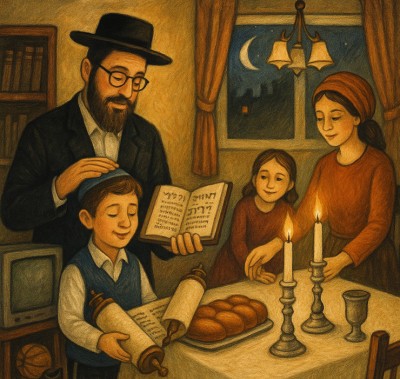

When Rabbi Mordechai Finkelman sat down with us to speak about parenting, he didn’t open with theories. He opened with a home. His parents, survivors who arrived in America as teens, were determined to build a Jewish life they themselves had been uprooted from. They did it with reverence for Torah—and the courage to change on a dime when they learned a halachah.
He recalled the day his nine-year-old sister came home from Bais Yaakov and shared that a married woman covers her hair. Their mother took the carriage, walked to the hat shop a block and a half away, and that afternoon began wearing a hat. Another day, their father returned from a weekly shiur with two neighbors. The family TV—“our very best friend,” he admits—was on. Their father pointed to it and asked the men, “Can you carry that?” They said yes. “It’s yours.” Why? “The Klausenberger Rebbe said: this little box will destroy American culture.” The next morning, there was more conversation around the table, more reading, more life. Lesson: don’t fear truth when it walks into your living room—welcome it.
What really belongs in our homes
Babysitters, Rabbi Finkelman said, should be positively influential Jewish role models. Cleaning help should clean. But food—the heart of a Jewish home—ought to be infused with a mother’s (or parents’) kedushah. He pointed to the Torah’s subtlety: Rivkah arrived with attendants, yet Yaakov cooked. Why wasn’t a maid preparing the food? Because seudos are spiritual work; the Jewish home’s Ruach is kneaded into its dough. He once told a cleaner plainly: “In this house, only my wife and daughters bake challah.”
He learned early what “cholov Yisrael” meant. As a child he innocently shared halachic lessons from yeshivah—no more M&M’s, Hershey bars, or even Carvel on a hot day. It stung at first (“Why did you tell her?” he remembers thinking). But watching parents embrace truth without resentment taught him that Torah changes are not losses; they are upgrades to the soul.
School–home partnership: how to really work together
A favorite line from his father became the family policy: “It’s not a popularity contest.” One year you like your rebbe, one year you don’t. Tuition is for learning. But, his father added a second clause: “He has to like you.” Respect and behavior are non-negotiable.
That principle guided Rabbi Finkelman as a parent. When his fifth-grader was suspended for answering back (“Why do you only tell me to stop talking?”), he didn’t storm the office. He sent his son to his room (no entertainment; suspension should not be fun), then drove to hear the rebbe’s side. In the classroom, fairness matters—“I didn’t see the other boy,” the rebbe said, which is fair. But when the boy added, “I don’t have to like the rebbe; the rebbe has to like me,” Rabbi Finkelman smiled. The idea was true—out of context. With calm conversation and mutual respect, the rebbe said, “Send him back.” Partnership means hearing both sides, modeling kavod, and solving, not scorning.
Rules matter, too—precisely because they shape dignity. When sneakers became fashionable in school, the yeshivah required black shoes—no white, no high-tops. He bought the black pair—and paid extra to dye the white Nike swoosh black. Why? “Because we follow rules.” Children learn Torah by seeing parents keep it in the small things.
Dunkin’ vs. “dunking”
“America runs on Dunkin’,” he quipped—but we run on dunking in the ritual waters of Torah. The world celebrates instant gratification; we celebrate earned growth. That’s why TV, violent movies, and smartphones aren’t harmless background—they shape desires. “Fun,” he noted, shares the gematria of “the Satan.” If it weren’t fun, there would be no yetzer hara. We don’t pretend we have the same entertainment; we offer different pleasures: warm Shabbat seudot, trips that fit halachah, and the inner pride of living like princes and princesses of Hashem.
He once took the family to a “science” IMAX in a maritime center. The very first scene was immodest beach footage. They left. The message wasn’t “we never have fun.” It was: we don’t trade eternity for ten minutes of excitement. And then you find a “yes”—a different activity that keeps joy and standards together.
Make Shabbat feel like royalty
Children should feel Shabbat when they walk into the dining room. At camp, the shul and dining hall used fluorescent lights all week; on Shabbat, only chandeliers and wall sconces glowed. The room felt different. At home, keep the Shabbat room special, stories light and age-appropriate, and the table warm and unhurried. Joy is a chinuch strategy.
Time equals love (tailored)
Create one-on-one time with each child. His wife staggered bedtimes—7:00, 7:15, 7:30—so each child had a short private slot for a story and a check-in. When an older child protested “not fair,” he taught real fairness: different bodies, different needs. Chanokh la’na’ar al pi darko starts at bedtime.
A stressed father once told him he’d left the house rather than argue: “There was a dirty diaper on the floor, toys everywhere, supper not ready.” Rabbi Finkelman sent him home—with flowers. “Whose child is that diaper from? She’s raising your children. Say ‘thank you.’ Perception is everything.” He cited Par’oh’s palace before and after “Ani Yosef”: same room, totally different view.
Build self-esteem the Torah way
As an 11-year-old, he complained that classmates who cheated got better grades. His mother flipped the report card and pointed to conduct and effort. “This side counts,” she said. “Effort counts.” No posting tests on the fridge, no child measured against a sibling. Praise specifically; correct privately. Rav Schwab taught: if you must give a patch, never in front of others. Better yet, cool down in another room first.
And catch them good: a mother once watched her crawling baby scoot across a plush blue carpet—melting chocolate in hand—stamping cocoa splotches every stride. She ran in and said: “Bless you!” Not because messes are ideal, but because the child mattered more than the carpet. That’s self-image you can’t buy.
Ask a rav. Then follow.
Every home needs a rav. As a teen, Rabbi Finkelman applied for a city youth job that required “living” in a different neighborhood. The official said, “We’ll put that address—totally legal.” He called his parents’ rav from a payphone. The answer was no. He stayed home. Years later, when vacationing, he advised parents to ask a sh’eilah about destinations. Orlando attractions, IMAX theaters—modesty and content matter. A rav’s guidance turns confusion into clarity.
Wealth, jealousy, and honest talk
Don’t fear your children’s questions. After Shabbat at a very affluent home—two playrooms, tall-ceilinged basement hockey—his 10-year-old asked, “Aren’t you jealous?” “I’m really not,” he answered, “but if you one day earn it honestly and keep the Torah, I’ll come for Shabbat and enjoy it with you.” About a luxury car an uncle bought: “If you get it and keep the Torah, you’ll drive me.” Never stifle; redirect. And he never buys lottery tickets: “I love my life as it is.”
The goal and the guarantee
Why do some struggle and drift? The standards are high, the pull outside is strong, and access is constant. The answer isn’t lowering kedushah; it’s raising warmth. Make home the place a child wants to be.
The blueprint is timeless: “Chanoch la’na’ar al pi darko.” Educate each child according to his way—his strengths, stage, and soul—and “gam ki yazkin lo yatur mimena,” even in old age, he won’t depart. The Zohar reads “ledorotam” as “ledirotam”—for your homes: if you want your dorot, your generations, keep going, make your dirot, your homes, glow with Shabbat, with simchah, with kavod, with steady, joyful Torah.
That’s the who, what, where, when, and why of parenting: truth welcomed, rules kept, Shabbat warmed, time given, egos protected, questions answered, and life loved.
Rabbi Yaniv Meirov is the CEO of Chazaq and Rav of Congregation Charm Circle in Kew Gardens Hills. Since 2006, he has helped thousands of Jews reconnect with their faith through community events, lectures, and public school outreach, earning recognition from gedolim, elected officials, and community leaders for its impactful work. As Chazaq Torah Talks recently aired its 214th episode with Manny Behar, Rabbi Meirov continues to bring thoughtful, heartfelt conversations to the Jewish world—bridging tradition with today’s challenges, one episode at a time. The Rav can be reached for comment at This email address is being protected from spambots. You need JavaScript enabled to view it..
The 5 W’s Of Chinuch: Who, What, Where, When & Why
Typography
- Smaller Small Medium Big Bigger
- Default Helvetica Segoe Georgia Times
- Reading Mode




